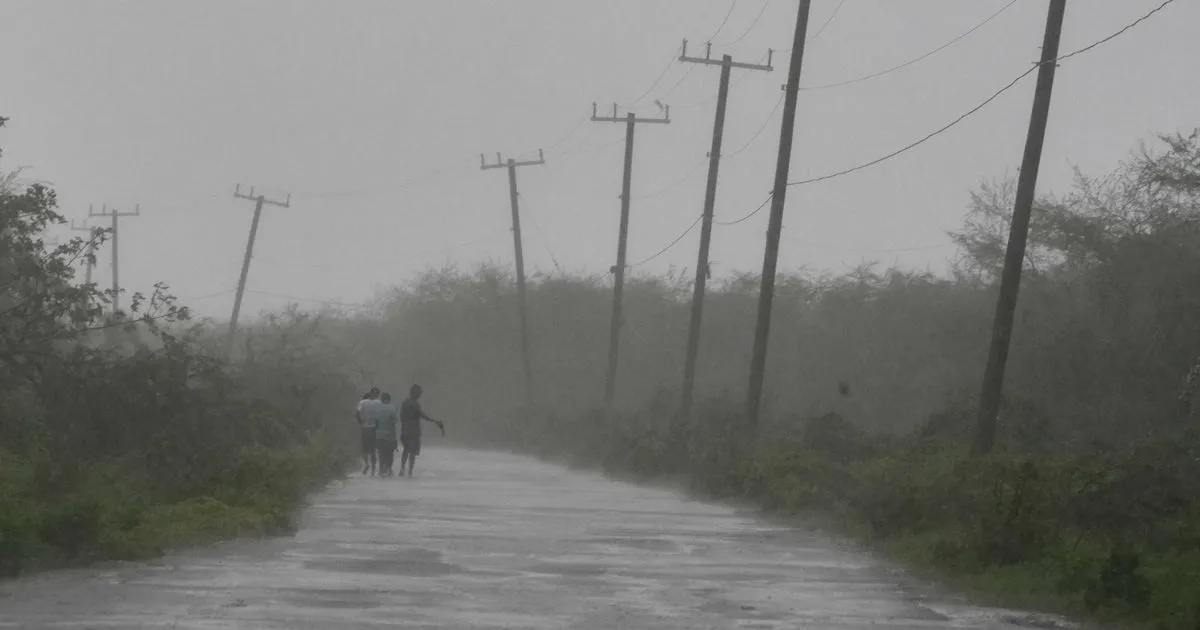
On Tuesday, Hurricane Melissa made a historic landfall in Jamaica, striking the island as a formidable Category 5 storm. The hurricane brought torrential rain and devastating winds, causing severe flooding in the country's southwest and ripping roofs off buildings. According to the Miami-based National Hurricane Center (NHC), Melissa is the most powerful hurricane to impact Jamaica since record-keeping began 174 years ago, with sustained winds reaching 185 mph.
After making landfall, Hurricane Melissa weakened slightly, with the NHC reporting winds had decreased to 130 mph, categorizing it as a Category 4 hurricane by Tuesday night. However, the storm was already showing signs of restrengthening as it approached eastern Cuba, where it is expected to make landfall early Wednesday morning as a major hurricane.
The storm initially came ashore near New Hope on Jamaica's southwestern coast, traveling northeast at 9 mph. As Melissa approached, reports of landslides, fallen trees, and widespread power outages began to emerge. By Tuesday evening, over 530,000 Jamaicans were without power, as stated by Minister of Local Government Desmond McKenzie. Additionally, the roof of the Black River Hospital sustained damage from the storm, prompting the evacuation of 75 patients.
Hurricane Melissa is expected to continue its trajectory over Jamaica and reach southeastern Cuba early Wednesday morning. Following that, it may impact the southeastern or central Bahamas later in the day, still classified as a hurricane. World Meteorological Organization tropical cyclone specialist Anne-Claire Fontan indicated that Melissa might be considered the "storm of the century" for Jamaica, predicting catastrophic damage to the island.
According to Necephor Mghendi from the International Federation of Red Cross and Red Crescent Societies, as many as 1.5 million people in Jamaica could be affected by Hurricane Melissa. The Jamaican government has warned of the potential for catastrophic damage, with Prime Minister Andrew Holness noting the lack of infrastructure capable of withstanding a Category 5 hurricane. He emphasized that the primary concern now is the speed of recovery.
Hurricane Melissa is forecast to dump between 15 to 30 inches of rain on Jamaica, with some areas potentially receiving up to 40 inches. The NHC has warned of catastrophic flash flooding and numerous landslides as a result of the heavy rainfall. For eastern Cuba, rainfall totals could reach 10 to 20 inches, with localized areas receiving as much as 25 inches, increasing the risk of life-threatening flash floods.
Officials are anticipating a life-threatening storm surge of up to 13 feet along southern Jamaica, raising concerns about the impact on coastal hospitals. Health Minister Christopher Tufton reported that some patients had been relocated from ground-floor wards to higher levels in the hospital to mitigate risks associated with the storm surge.
As of Tuesday, Hurricane Melissa has been linked to seven deaths across the Caribbean, including three in Jamaica, three in Haiti, and one in the Dominican Republic. Colin Bogle, an adviser with Mercy Corps based near Kingston, noted that many families are choosing to shelter in place despite government evacuation orders in flood-prone areas, expressing fears of losing homes, livelihoods, and the uncertainty that the storm brings.
Jamaica's water and environment minister, Matthew Samuda, stated that over 50 generators are on standby for deployment post-storm, but he urged citizens to conserve clean water. In Cuba, authorities have issued hurricane warnings for multiple provinces and have evacuated approximately 735,000 residents as a precautionary measure.
Hurricane warnings have also been issued for the southeastern and central Bahamas, with a tropical storm warning in effect for the Turks and Caicos Islands. The U.S. State Department has issued natural disaster travel alerts for Cuba, Jamaica, Haiti, and the Bahamas, advising American citizens to consider leaving while flights remain available or to prepare to shelter in place.
As Hurricane Melissa continues its path through the Caribbean, the impact on affected communities is expected to be profound, necessitating a coordinated response to ensure the safety and well-being of all residents.